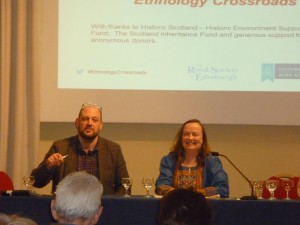by Graham Turner
If you’re a wee bit geeky about higher education, like some of the staff of LINCS, you will have been holding your breath just after midnight on the morning of 18th December. You weren’t? What can I say? I guess you just had to be there.
What was the fuss about? It was the announcement of the results of the Research Excellence Framework 2014, aka REF. How did LINCS fare? Pure dead brilliant.
In fact, Heriot-Watt University performed well as a whole in the REF rankings. The ‘headline’ announcement is that Heriot-Watt has risen to 33rd position in the UK (4th in Scotland), as compared with 45th in the 2008 audit. (You can see lots more, including a podcast/video presentation of our results by the University’s Principal, here http://www.hw.ac.uk/news/heriot-watt-demonstrates-significant-20137.htm.)
REF is a UK-wide audit of research performance. Every six years or so, it reviews the work of every department in every university in the land. That’s 154 universities, submitting 1,911 reports, covering research by 52,061 members of staff.
A series of expert panels were created – LINCS’ own Professor Máiréad Nic Crath was selected for one of these, which is a real endorsement of the esteem in which Máiréad is held by academic peers far and wide. The brave panel members then spent most of the year reading 191,150 publications (!) and reaching judgments about their quality.
Besides digesting the research itself, the panellists read documents describing the research environment in each department. And, in a brand new development, they also reviewed 6,975 case studies designed to demonstrate the ‘impact’ of research in ‘the real world’ – how it was valued by policy-makers, industry, the professions and the public.
Eventually, an elaborate series of grades and profiles were generated from the results. As soon as they were announced (last Thursday morning), the press inevitably went into overdrive producing league tables. (Those familiar with the soccer player Gary Lineker’s remark that “Football is a simple game: twenty-two men chase a ball for 90 minutes and at the end, the Germans always win” will recognise what tends to happen in the REF tables – for Germans, read Oxbridge and London.)
I know, I know – you just want to know how LINCS got on.
Well, one-third of our research was declared ‘world leading’ for its originality, rigour and significance by the Modern Languages & Linguistics panel. In respect of that ‘world leading’ measure, LINCS stands in 17th place in the UK, and top in Scotland.
Panels were looking assess the ‘reach and significance’ of our impact on the economy, society and culture. And here, we scored 90% ‘outstanding’ – placing us 2nd in the UK, and again top in Scotland.
For its ‘vitality and sustainability’ as an environment in which to do research in our fields, LINCS was rated 19th overall in the UK.
As I said, it all starts to get a bit geeky after a while. So why might it matter to you?
What REF tells you boils down to three things. One, you have a painstaking, independent endorsement of the claim that we do know what we’re talking about in our subject areas. Two, if you are interested in studying or working here, LINCS is a stimulating, supportive place to be – and that character is built in for the long term. And three, we’re really not here just to stroke our brain cells: we care passionately about doing work that changes people’s lives.
One last thought. It’s important to recognise that a department’s research performance is not the result only of the efforts of those named in REF as ‘active researchers’, but of everyone involved in the life of the department. That means academics, secretariat, students and associates.
It’s always a team effort to make sure that, collectively, we’re doing all the things a good department should. LINCS truly does do all of those things, as REF helps to underline.
So, as we head into the holiday season, here’s a toast to each and every person who takes part in the life of LINCS, for every kind of contribution they make.


